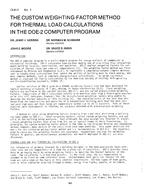
CI-81-03-3 — The Custom Weighting-Factor Method for Thermal Load Calculations in the DOE-2 Computer Program
- Comments Off on CI-81-03-3 — The Custom Weighting-Factor Method for Thermal Load Calculations in the DOE-2 Computer Program
- ASHRAE
The DOE-2 computer program is a public-domain program for energy analysis of commercial or residential buildings. DOE-2 calculates hour-by-hour energy use of a building from information about building location, construction, and operation. DOE-2 employs weighting factors for calculation of thermal loads and room air temperatures. The weighting-factor method was first introduced by Mitalas and Stephenson; it represents a compromise between simpler methods, such as steady-state calculations that ignore the ability of building mass to store energy, and more complex methods, such as complete energy-balance calculations. The weighting-factor method is employed for hourly calculations by the American Society of Heating, Refrigerating and Air-Conditioning Engineers, ASHRAE.
Earlier versions of DOE-2 used only ASHRAE weighting factors that had been developed for typical building structures of light, medium, or heavy construction. These weighting factors are available in the current version, DOE-2.1, and are called precalculated weighting factors. Comparisons of DOE-2 calculated results with measured data from a direct-gain passivesolar test cell indicated, however, that the precalculated weighting factors were unable to describe the thermal behavior of this building. Two characteristics of the test that differed from the construction and operation of a conventional building were that the test cell had very high mass and that large air-temperature swings (up to 20°C) occurred. Both of these features were instrumental in limiting the accuracy obtained with precalculated weighting factors.
A method of calculating weighting factors directly from input data describing a building has been added to DOE-2.1. These weighting factors, called custom weighting factors, are specific to the building being analyzed. They eliminate the many assumptions inherent in precalculated weighting factors that arise from the use of typical rooms in their formulation. In principle, the custom weighting-factor method is the same as the original Mitalas and Stephenson method; however, many details of the calculation have been modified. This paper describes the basis for the custom weighting-factor method and its implementation in DOE-2.1. The equations used to calculate the weighting factors are developed. Assumptions required for weighting factors in general, and miscellaneous assumptions and models employed in DOE-2.1 are also discussed.
Product Details
- Published:
- 1981
- Number of Pages:
- 16
- File Size:
- 1 file , 1.3 MB
- Product Code(s):
- D-CI-81-03-3
- Note:
- This product is unavailable in Russia, Belarus

